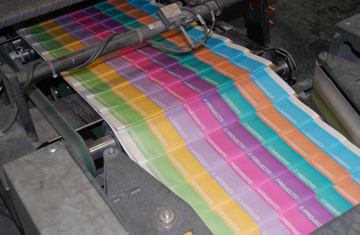
The Newspaper Club printing press
Do you harbor a desire to become a newspaper tycoon but have only the budget of a city-room intern? Well, extra, extra, read all about it: Newspaper Club, an online London start-up, can help burgeoning Rupert Murdochs get started — so long as your idea of a media empire ranges from just five to 5,000 copies of your gazette.
In an era when traditional newspapers are hemorrhaging readers and staff as their revenues head south, the year-old Newspaper Club is proving there's still untapped demand for the medium — just not in the traditional sense. The kinds of papers Newspaper Club's clientele tend to print include bloggers' fanzines, literary works, school journalism projects and wedding-day keepsakes. The company also has a growing list of corporate clients, including the BBC, Wired's U.K. edition and smoothie-maker Innocent Drinks. Newspaper Club isn't about the news or the content, explains co-founder Russell Davis, "it's about ink on paper."
Here's how it works: Gather the words, pictures and graphics you want to see in print. Then design your 12-page (minimum) tabloid-size paper — either by using Newspaper Club's on-site layout tool and your own software and sending the result to the site as a PDF, or by letting the site's in-house designers do the job for you. Newspaper Club then arranges for a printer to handle your press run and ships the finished work to your door. "It's like hitting the print button [on a computer] in bulk," says Ben Hammersley, editor at large for Wired's U.K. edition, which used Newspaper Club to print 500 copies of a compendium of highlights from several issues of the magazine and then gave them away at two events it sponsored.
The Newspaper Club's formula is based on a dirty little secret in the newspaper business: the giant presses that pump out daily papers by the millions every morning or afternoon sit idle for most of the rest of the day. To fill their downtime, printing plants do small press runs at surprisingly affordable prices. Most newspapers in Britain — the major dailies as well as smaller weeklies — no longer own their own presses. Instead, they contract the work out to independent printing companies or even rival newspapers, and "they've all got capacity," says Davis, a former ad-industry executive who co-founded the club with graphic designer Ben Terrett and software engineer Tom Taylor. "We've not come across a printer who's too busy."
The Club's three co-founders — all longtime bloggers — had their eureka moment in early 2009, when they cobbled together a newspaper featuring the Web posts of 23 friends and called it Things Our Friends Have Written on the Internet. Amazed at how relatively inexpensive it was, they opted for a press run of 1,000, and readers of their blogs quickly snapped them all up. "We realized that print is still a potent way to deliver content," Davis says, even if the newspaper business model is broken.
The site's pricing is on a sliding scale and ranges from about $50 for five black-and-white copies to about $2,250 for 5,000, a mere 45 a copy. While the club makes money on each paper it sells (it won't say how much), it's not quite in the black yet, though Davis predicts it will soon recoup the $190,000 in initial financial backing it received from 4iP, the investment arm of British TV network Channel 4. Moreover, he claims, the site can double its customer base with no additional costs at all.
"It's a fun idea," says media critic Roy Greenslade. "We still enjoy the feel of newsprint, the smell of it, and that we can read it in bed or the bathtub — they're tapping into that." Still, while those things may help keep interest in newsprint alive, he adds that the Newspaper Club's service will nevertheless "probably always be a fringe activity." Davis concedes that "we're not going to become Google" but thinks on-demand newspaper printing "could itself become quite big — bigger than us, because others will get into it." Indeed, there's nothing stopping newspapers or print shops from offering the service themselves, and Davis says Newspaper Club is open to partnering with one or more of them.
It's also a concept that should travel well. Newspaper Club doesn't take overseas orders because of high shipping costs. But it hopes to soon set up operations in the U.S., probably on a city-by-city basis. The site's partners attended the South by Southwest music festival in Austin, Texas, in March and published a 1,000-issue-run newspaper — having hired the presses of the daily Austin American-Statesman — to demonstrate what they do.
Ironically, says Wired U.K.'s Hammersley, it's the young digerati who think Newspaper Club "is the coolest thing they've ever seen." Despite their having so many electronic ways of expressing themselves — blogs, tweets, video uploads — many find newsprint appealing, he says, but are shut out of it because they don't own printing presses. "Now, suddenly, thanks to Newspaper Club, we've got a printing press." Somewhere, Johannes Gutenberg is smiling.
